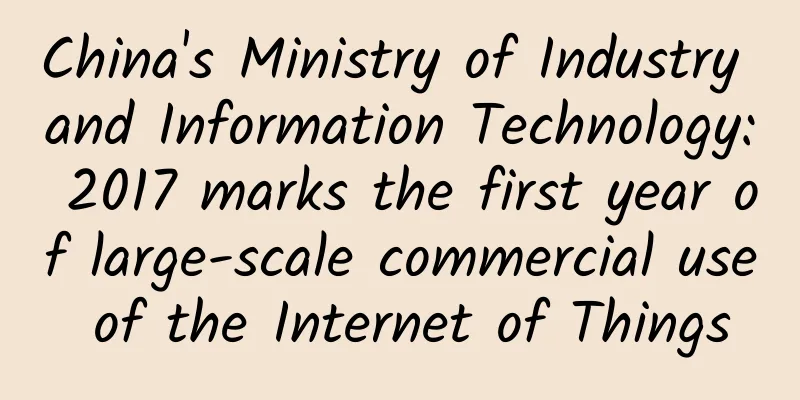China's Ministry of Industry and Information Technology: 2017 marks the first year of large-scale commercial use of the Internet of Things

|
Since the international standards were finalized in 2016, the global Internet of Things industry has matured rapidly and entered the “first year of large-scale commercial use” in 2017. Wen Ku, director of the Information and Communications Development Department of the Ministry of Industry and Information Technology of China, made the above statement on the 27th when attending a press conference held by the State Council Information Office. On October 27, the State Council Information Office held a press conference. Wen Ku, Director of the Information and Communications Development Department of the Ministry of Industry and Information Technology, introduced the development of the industrial communications industry in the first three quarters of 2017 and answered questions from reporters. Wen Ku said, "In terms of network scale, chips and some applications, China is in a leading position in the world."
At present, China's three basic telecommunications companies have started the construction of NB-IoT (narrowband Internet of Things) networks, which will gradually achieve wide coverage across the country. In 2017, the scale of base stations in the entire network will exceed 400,000, and a number of provinces and cities have started commercial networks. In terms of commercial chips, companies such as Huawei HiSilicon have begun to have the ability to supply in batches, and companies such as RDA Microelectronics and ZTE Microelectronics are also accelerating their progress. It is expected that a mass production situation will be formed with multiple manufacturers supplying. As the industry scale expands, the price of terminal modules, which previously restricted the commercialization of the Internet of Things, has dropped to a reasonable level. Previously, China Telecom purchased 500,000 NB-IoT modules at a unit price of US$5. Wen Ku introduced that many local governments, such as Yingtan, Jiangxi and Fuzhou, Fujian, support the development of NB-IoT and are promoting the deployment of hundreds of thousands of NB-IoT-based smart water meters; Tibet is trying to introduce NB-IoT networks into the yak market. "But overall, the types of NB-IoT applications are still a bit monotonous." Wen Ku said that in the future, efforts should be made to increase the application, development and promotion of the Internet of Things. In addition to water meters and gas meters, more personalized applications for ordinary public users should be launched. In addition, efforts should be made to increase research and development on chips, and the scale supply capacity of multiple manufacturers and enterprises should be formed as soon as possible to meet market demand. |
Recommend
Beyond 5G: A revolutionary leap toward the frontier of 6G network sensing
In the rapidly evolving world of telecommunicatio...
What are the differences between NB-IoT and LoRa in terms of power consumption of IoT terminals?
To make a comparative analysis between NB-IOT and...
How Wi-Fi 6, WWAN and 5G make fully wireless office possible
For use cases, fully wireless connectivity for of...
Huawei Cloud Internet Summit: 5G+Cloud will reshape the pan-Internet
Recently, the "Shanghai·Choose Extraordinary ...
Mobile layout: Do you enter from a single point or start with the platform?
Mobility has become a standard feature of enterpr...
Summary information: Jinfeng Cloud/51 Point Quality Cloud/Yuan Cloud/Xin Tianyu Interconnection
The annual Double Eleven is also an online and of...
Adding more content rights makes 5G packages more popular
China Telecom's 5G package users have accumul...
Let us say goodbye to TCP together!
PS: This article does not involve knowledge about...
Development Trends and Prospects of Future Networks
[[375296]] Recently, Liu Yunjie, academician of t...
Network | Can 5G’s cool applications be realized?
[[322560]] 5G is coming to us rapidly. Once upon ...
The survey report shows that in September 2020, the three major operators basically achieved 100% processing of spam text messages.
Recently, part of the content of the "SMS In...
The embarrassing 400G: When will the operator backbone network be commercially available?
400G backbone network, a term that has not yet ar...
Edge computing is the driving force for enterprise IT transformation in the next decade
According to forecasts, the number of 5G subscrib...
Cautiously optimistic! The plot of the "ZTE incident" has reversed, but the story continues
[[229418]] First, the Made in China 2025 stra...
KhanWebHost: $1/month KVM-2GB/10GB SSD/1TB/Texas
KhanWebHost recently released a US VPS hosting pa...









